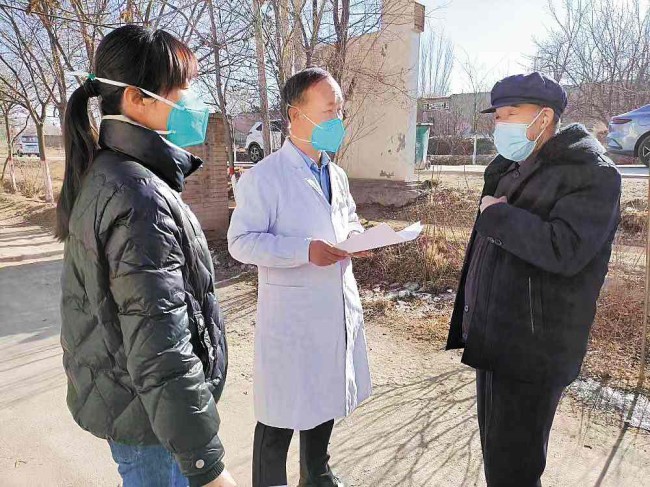Gansu teams keep residents in good health

Members of a medical team talk with an elderly resident (right) in Liangzhou district, Wuwei, Gansu province. [Photo/China Daily]
Doctor visits, medicine and treatment being provided for patients at home
Recently, hundreds of medical teams were busy shuttling between residential communities and villages in Liangzhou district of Wuwei, Gansu province.
"We capitalized on the role of Communist Party of China members. We immediately mobilized 4,500 people and organized them into 482 teams to provide medical services during the peak in COVID-19 infections," said Shi Cai, deputy director of Liangzhou's organization department.
Each team was comprised of a Party chief from grassroots organizations, two medical workers, three village cadres and a number of volunteers.
The teams identified key groups, distributed free medicine, publicized epidemic prevention and control policies and encouraged eligible residents to get vaccinated.
They conducted surveys of the elderly, children, pregnant women, the disabled, patients with severe chronic diseases and other key groups to gather their basic information and health status.
"In all, 117,500 residents age 65 and older were identified," Shi said.
According to their age, underlying diseases and degree of risk, those surveyed were divided into three groups marked red, yellow and green.
"Doctors visited residents in the red category at home once a day to measure their blood pressure, blood sugar and blood oxygen saturation levels, as well as to offer guidance on medications," said Liu Fang, the doctor in Yaogou village in Jinyang township.
"Residents in the yellow category were visited every three days, while those in the green category were given contact cards to enable them to reach us anytime they need," Liu said. "We have opened a fast-track channel for 24-hour medical treatment to minimize risks."
Ding Wanyou, head of Yaogou village, said residents appreciated the service offered by the medical teams.
"They distributed free medicines to key groups at home, providing them with antipyretic and analgesic drugs, cough medicines, masks, thermometers and other items," Ding said.
"Door-to-door help was provided to people who needed to buy medicines and to severe cases of infection, and the teams coordinated with health authorities to get patients hospitalized," he added.
Data from Liangzhou district center for disease control and prevention indicate that the first wave of COVID-19 infections is all but over, with the peak in severe cases declining and a significant decrease in the number of patients seeking medical treatment at grassroots medical institutions.
"The 482 medical teams helped a lot. They are not as busy now. We will make appropriate adjustments based on epidemic trends and local needs," Shi said.
-
As AI encounters Dunhuang's art, the ancient caisson ceiling bridges centuries to the present.
View all stories

 Gansu thrives from green development
Gansu thrives from green development  >
>